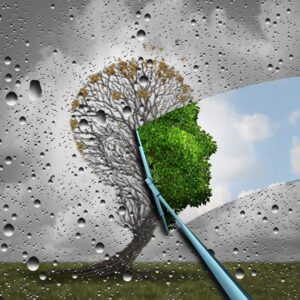
Dementia is a non-specific syndrome wherein the cognitive function of the brain is progressively compromised. Alzheimer’s is the most common cause of dementia observed, with the number of patients suffering from this condition ranging between 50% and 60%. Memory, problem solving, language and attention are the spheres of cognitive function that are affected by dementia at the time of onset. Later, one loses his orientation, track of time or even his bearings and fail to identify those around him.
Dementia is a non-specific syndrome wherein the cognitive function of the brain is progressively compromised. Alzheimer’s is the most common cause of dementia observed, with the number of patients suffering from this condition ranging between 50% and 60%. Memory, problem solving, language and attention are the spheres of cognitive function that are affected by dementia at the time of onset. Later, one loses his orientation, track of time or even his bearings and fail to identify those around him.
The causes of dementia are varied:
1. Head injury
Be it a vehicular accident or a tumble down the stairs, gunshot wounds in the head or an unfortunate hit during a boxing bout, when brain cells are damage due to the jolt received by the head, dementia can follow. However, such head injuries are often reversible causes – that is dementia is curable.
2. Alzheimer’s Disease
Alzheimer’s disease is defined as a neurological condition that results in the irreversible loss of neurons and subsequently cognitive and intellectual capability. Memory loss and inability to reason are profound symptoms of this condition, making social functioning impossible for those affected. Alzheimer’s is the leading cause of dementia.
3. Hydrocephalus
Hydrocephalus is the term that refers to the collection of too much cerebrospinal fluid outside the brain. Cerebrospinal fluid is the medium in which the brain floats and is protected. However, too much fluid is counter-productive or fatal and exerts pressure on the brain, compressing it. Even when the fluid accumulates in ventricles, brain tissue is compressed from within. This condition results in one losing mental control, with memory loss, loss of control on urinary bladder and difficult in transmitting motor signals.
4. Stroke
Cardio-vascular problems too can cause dementia. Every cell in the body requires adequate oxygen to function, and the brain is no different. If there are any cardio-vascular problems that hinder this oxygen supply to the brain, vascular dementia is caused.
5. Lewy Bodies
Lewy bodies are spherical structures that develop in neurons and damage the surrounding brain tissue. These bodies damage memory concentration and ability to communicate verbally. The symptoms caused by Lewy bodies are sometimes similar to those of Parkinson’s disease and proper diagnosis is called for.
The symptoms of dementia are easily observed as they are manifested in the form of cognitive and behavioral changes. The symptoms of dementia change according the stage of the condition, from mild to intermediate to severe.
Symptoms of mild dementia:
· Language problems wherein verbal communication is hindered
· Inability to recall names, schedules, chores
· Losing things
· Judgmental errors uncharacteristic of the individual
· Mood swings that are unaccounted for
· Behavioral changes like paranoia
· Disorientation observed by one trying to get to familiar surroundings
Symptoms of Intermediate Dementia:
· Loss of motor control with inability to walk straight, calculate the distance between steps resulting in tripping
· Inability to carry out routine functions like taking a bath, using the toilet, eating or dressing
· Hallucination
· Increased disorientation with even home becoming unchartered territory
· Disturbed sleep and altered body clock
· Greater loss of cognitive functions
· Increased behavioral disorders including altered sexual behaviors, aggression
Symptoms of acute / severe dementia:
· Acute version of most symptoms observed at mild and intermediate levels of dementia
· Worsened motor functions – inability to walk or move about unassisted
· Short term and long term memory loss
· Inability to perform any activity without assistance
· Dehydration, malnutrition, seizures, infections and loss of bladder control are at profound levels, making living independently impossible.
Those suffering from acute dementia can’t survive without medical assistance and human support and the functions of the brain are affected in more ways than one.
Irina Carter is the author of the site: Sildenafil Citrate UK where you can get a valuable run-down about ways of men’s problems and its medications. She loves writing about men’s health, supplements, nutrition, fitness and beauty.


In recent years, the quality and authenticity of olive oil have come under scrutiny, with shocking revelations about widespread fraud in the industry. A groundbreaking episode of the popular news program “60 Minutes” shed light on this issue, exposing a disturbing trend of adulteration in many well-known olive oil brands The “60 Minutes” Investigation The […]


The American food system is facing a critical challenge that has been decades in the making. A regulatory loophole from the 1950s has allowed food companies to operate with minimal oversight, potentially exposing consumers to thousands of untested chemicals in their daily diets. This situation has created a significant public health concern that demands immediate […]


This is outrageous and a serious threat to the human brain! Look at these headlines! Recent scientific studies have revealed alarming evidence of nanoplastic accumulation in various human organs, with the most shocking findings related to the brain. A preprint study from early 2024 found particularly concerning levels of microplastics in human brain samples Brain […]